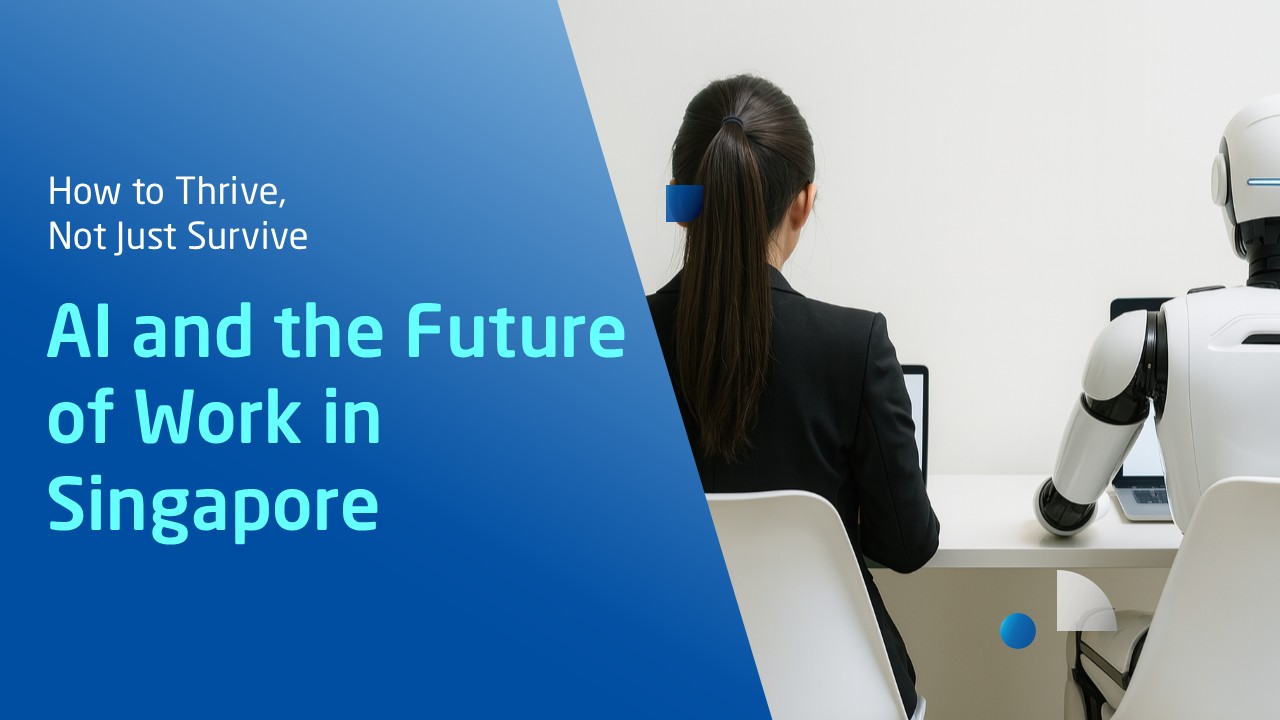AI and the Future of Work in Singapore: How to Thrive, Not Just Survive
Key Points:
- How AI is changing hiring in Singapore and how both employers and job seekers can adapt
- Which jobs in Singapore are being disrupted or created due to AI adoption
- Where to upskill for AI-related roles using government-supported programmes
- How to prepare your CV and skill set for AI-influenced hiring processes
- Why adaptability is now more important than qualifications, and how RGF Singapore can help

Singapore’s AI Moment
Artificial Intelligence is reshaping the way Singapore works. Across sectors like healthcare, finance, logistics, and manufacturing, AI is becoming central to operations, hiring, and business strategy (Ministry of Digital Development and Information, 2024).
At RGF Singapore, we have seen this transformation firsthand. Our clients are adopting AI tools at speed, and job seekers are asking the same key question: how can I stay relevant when the workforce is changing so quickly?
Singapore’s commitment to responsible AI development was further reinforced during the 2025 Committee of Supply debate. The Ministry of Digital Development and Information introduced new national initiatives under the Smart Nation 2.0 and AI Strategy 2.0 frameworks to help people, workers, and businesses adapt to the AI era. These efforts focus not only on innovation, but also on digital inclusion, public trust, and practical application.
AI in Hiring: Opportunities and Accountability
Hiring processes are increasingly supported by AI. Employers are using resume scanners, online assessments, and behaviour-based algorithms to shortlist candidates more efficiently. However, the Ministry of Manpower has stated that companies using such tools must ensure fairness, perform regular audits, and remain transparent with applicants (MOM, 2024).
To guide responsible usage of AI in hiring, Singapore’s government has introduced practical tools such as the Model AI Governance Framework and open-source audit kits. Employers are encouraged to assess their systems regularly to ensure decisions remain fair and objective. Job applicants should also be informed when AI is being used in the selection process.
If a candidate feels they’ve been treated unfairly during an AI-assisted recruitment process, they have the right to raise their concerns with the Tripartite Alliance for Fair and Progressive Employment Practices. This ensures that even as companies adopt new technologies, ethical hiring remains a national priority.
At RGF, we combine technology with empathy. While we use digital tools to improve speed and accuracy, all candidates are still evaluated by our consultants. We listen, we advise, and we match based on long-term fit, not just algorithms.
What Jobs Are Changing?
Routine-heavy jobs such as data entry, clerical processing, and standard customer service are among the first being replaced or redesigned (Channel News Asia, 2024).
But this disruption is not one-sided. LinkedIn data shows that Singapore has experienced over 565 percent growth in AI-related skills since 2016, the fastest rate in Southeast Asia (Singapore Economic Development Board, 2024).
Roles in AI product management, machine learning engineering, cloud infrastructure, and cybersecurity are all seeing strong demand. These roles require technical knowledge, but also the ability to adapt, solve problems, and collaborate across teams.
While AI job titles are becoming more common in Singapore, much of the current work focuses on applying existing tools rather than building original AI technologies. Many companies are prioritising implementation over innovation, especially among small and mid-sized enterprises that may lack the resources of larger global firms. There’s also a noticeable trend of AI development being driven from the top through policy, investment, or corporate strategy, rather than growing organically from the ground up.
Is Singapore Ready? Here’s What’s Already Underway
More than 7,000 Singaporeans upskilled through government programmes such as the Career Conversion Programme in 2023. Most retained employment in their new roles (MOM, 2024).
Budget 2025 is expected to increase support for SME AI adoption, workforce training, and real-world implementation (Human Resources Online, 2024).
At the same time, competition is intensifying. Singapore’s AI job market is attracting talent from around the world, especially from countries with deep technical expertise. For local professionals, standing out increasingly means having more than just technical skills, it requires combining that knowledge with strong domain experience and the ability to apply it meaningfully in real-world business settings.
To help workers stay competitive, Singapore has updated its Skills Framework for Infocomm Technology and expanded programmes like SkillsFuture for Digital Workplace 2.0. These now include hands-on training in artificial intelligence and generative AI, helping employees apply AI tools to improve productivity at work. Broader access to such programmes means more Singaporeans can future-proof their careers.
On the community front, digital literacy is being strengthened through initiatives like the enhanced Digital Skills for Life framework and AI showcases in public libraries. These are designed to help people of all ages learn how to use generative AI responsibly and effectively, while building confidence in navigating an increasingly digital society.
Beyond professional development, Singapore is also investing in digital inclusion for the broader community. Through the enhanced Digital Skills for Life framework, citizens can now access new content on generative AI, designed to help them understand both the opportunities and the risks. The National Library Board has also begun rolling out AI showcases across public libraries to give Singaporeans hands-on exposure to real-world applications of AI, building trust and confidence in technology at every level of society.
In our latest Singapore survey, 53% of job seekers said that the biggest benefit of AI was helping them complete tasks faster and more efficiently, while 65% of employers echoed this, identifying productivity gains as AI’s most valuable impact in the workplace. Other notable benefits cited by talent included risk reduction (17%), innovation (15%), and more personalised engagement (15%). Among employers, innovation was selected by 18%, while 13% valued AI’s ability to personalise processes. These findings show that while productivity is the clear standout, both talent and employers also recognise AI’s potential to improve quality and creativity at work. This alignment offers a promising foundation for organisations looking to integrate AI in a way that supports both performance and people.
How to Prepare as a Job Seeker
- Understand how hiring is changing: Resume scanners and digital assessments are common. Keep your formatting clean, use keywords, and focus on measurable results.
- Build skills that complement AI: Learn data analytics, automation tools, and cloud platforms. Even a basic understanding of AI concepts adds value.
- Develop soft skills: Critical thinking, communication, and adaptability remain vital in AI-enhanced workplaces.
- Stay informed: Track job listings weekly. Note recurring tools, languages, or qualifications, and use them to guide your learning.
- Seek support: A recruitment agency in Singapore like RGF can help match you with future-ready roles.
What Employers Should Consider
- Be transparent about the use of AI in recruitment
- Hire based on skill and potential, not just education or past roles
- Invest in upskilling programmes for your existing teams
- Partner with recruiters who understand both people and technology
- Leverage government tools like the GenAI Playbook and GenAI Navigator, especially designed to support SMEs in adopting AI tailored to their business needs
The Government is actively supporting businesses through structured resources, such as the GenAI Playbook for Enterprises and the GenAI Navigator for SMEs. These tools offer practical, grant-supported AI solutions that reduce the complexity of adoption and help businesses enhance productivity. They are accessible via the CTO-as-a-Service platform.
For business leaders, the journey into AI adoption no longer needs to be overwhelming. The Infocomm Media Development Authority (IMDA) recently launched the GenAI Playbook for Enterprises, a step-by-step guide that helps companies identify use cases and implement AI based on their digital maturity. SMEs, in particular, can benefit from the GenAI Navigator, a tool that recommends AI solutions matched to their specific business needs, with grant support to reduce cost barriers.
In our survey, a small yet notable percentage of employers (4%) shared that they are still unsure about the benefits of AI. This highlights the ongoing need for education and practical guidance, especially for companies that are earlier in their AI journey.
Redefining Survival of the Fittest
In today's world, survival of the fittest means being willing to adapt. AI is unlikely to replace your job if you know how to work alongside it. You do not need to be the most technical or the most experienced person in the room. What matters more is your willingness to learn, adapt, and grow with the changes around you.
While many professionals fear being replaced, our survey findings suggest that most job seekers already see AI as a tool for efficiency, not a threat. The key is to stay curious and build complementary skills.
What’s Next?
Whether you are a job seeker trying to stay ahead or an employer building tomorrow’s workforce, Singapore’s AI strategy offers a clear direction. By combining practical tools, accessible training, and responsible governance, the country is making sure that no one is left behind. The future of work is not just about technology, it’s about people who are ready to grow with it.
If you are ready to take action, start here:
- Submit your CV to RGF Singapore
- Are you hiring? Talk to us and we can help!
- Explore jobs in AI, technology, and digital transformation
- Download our Salary Guide to benchmark your next move
- Read more insights on upskilling and workforce transformation





















